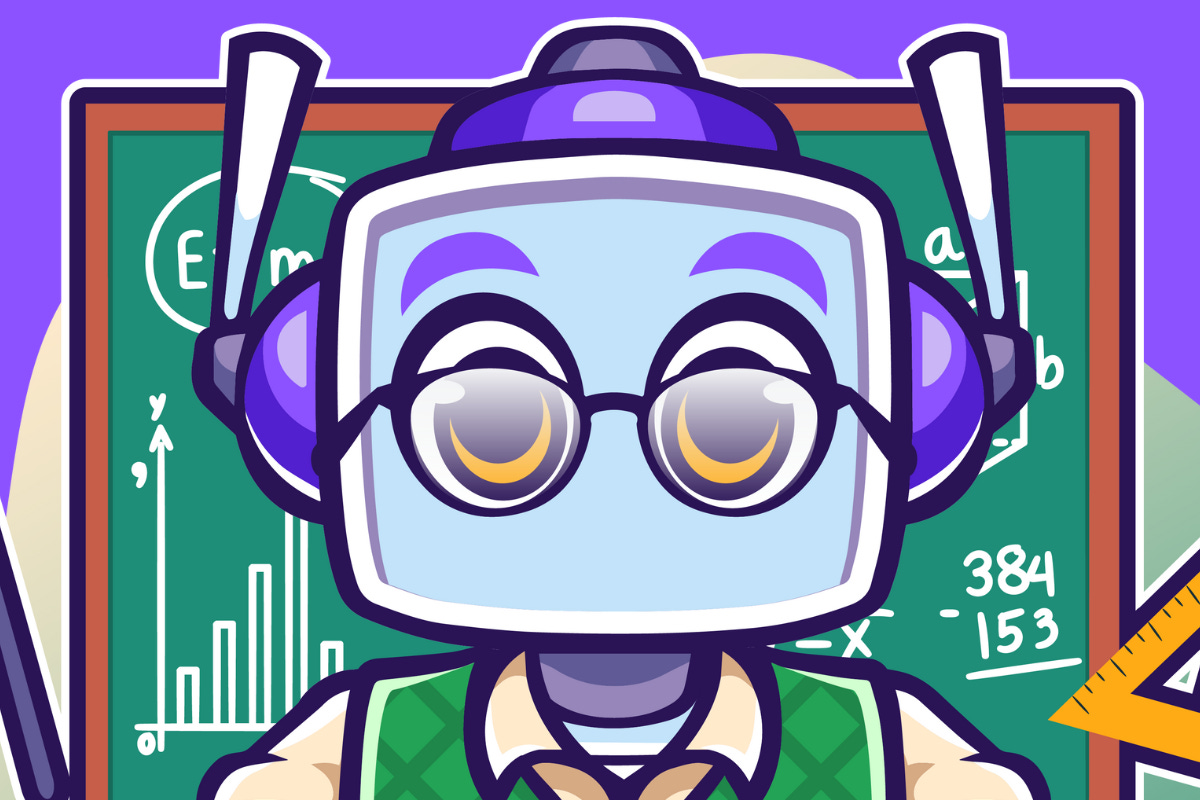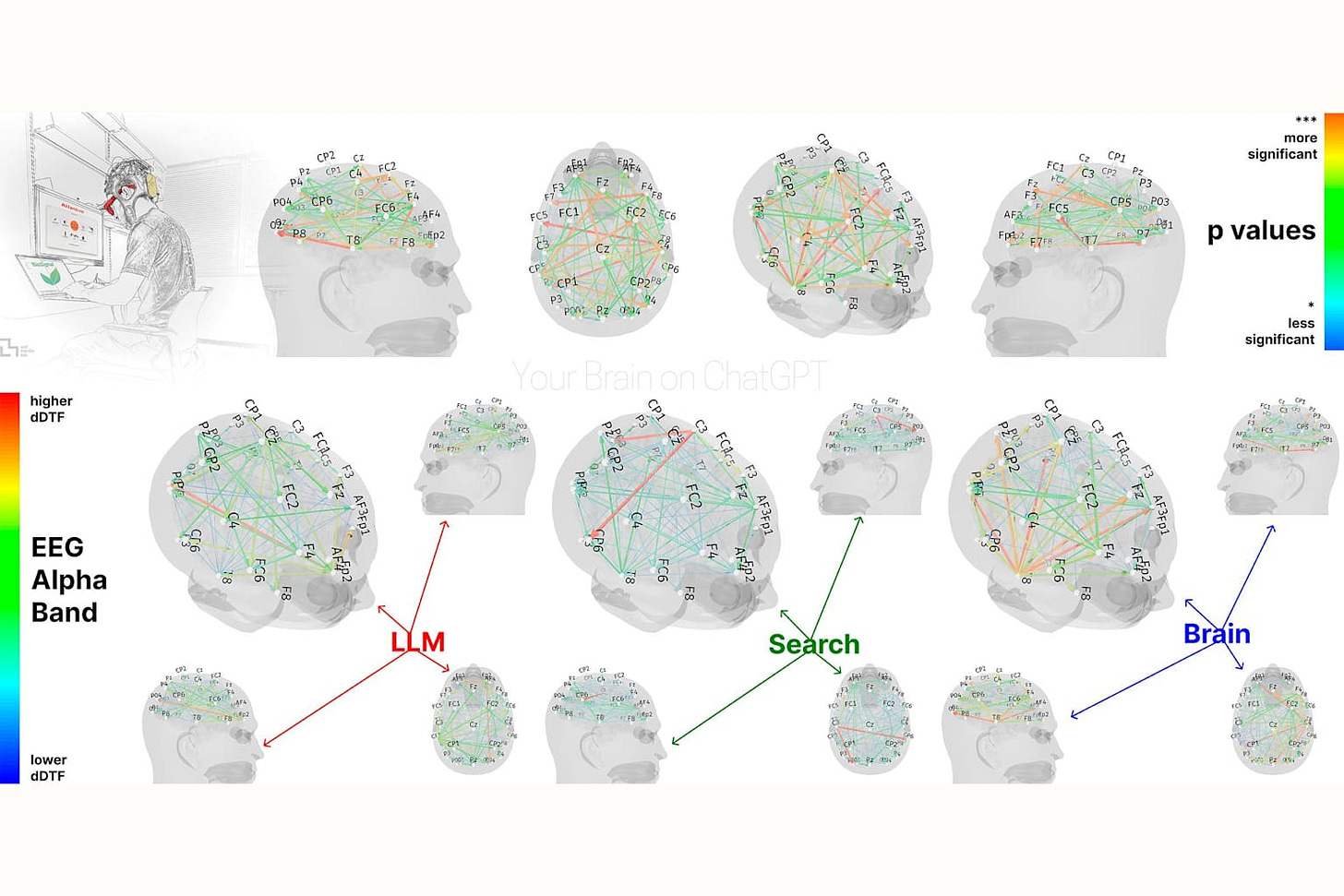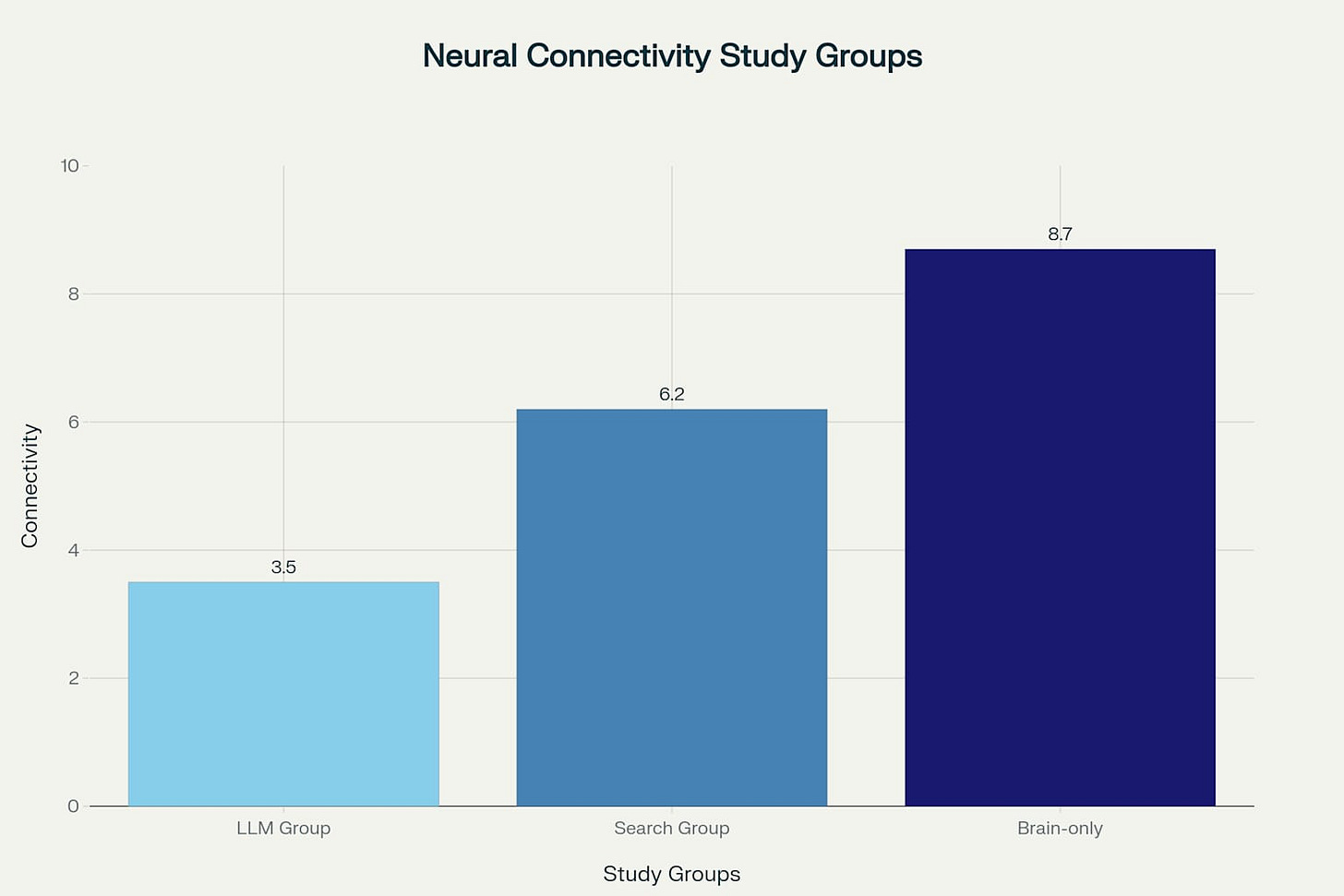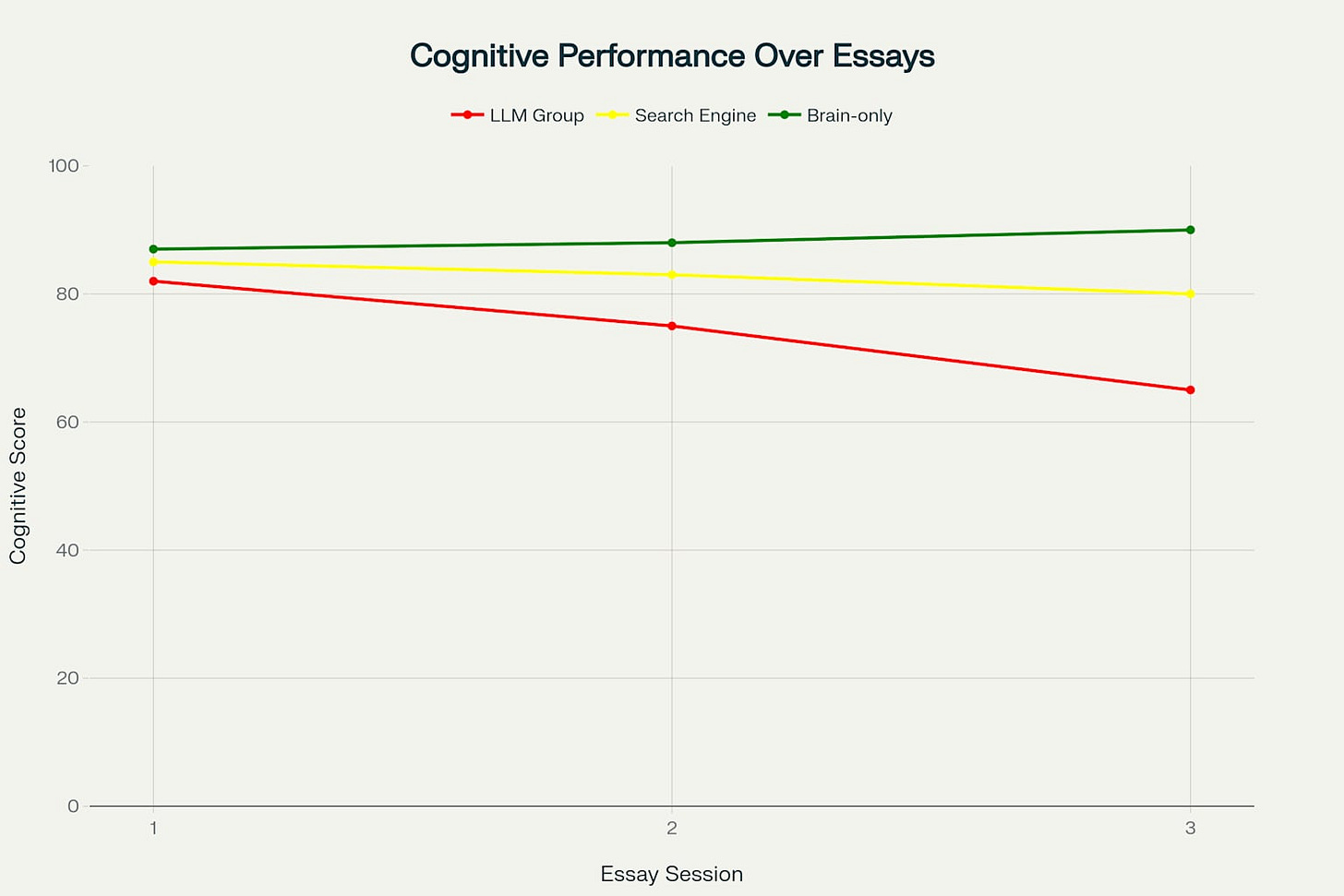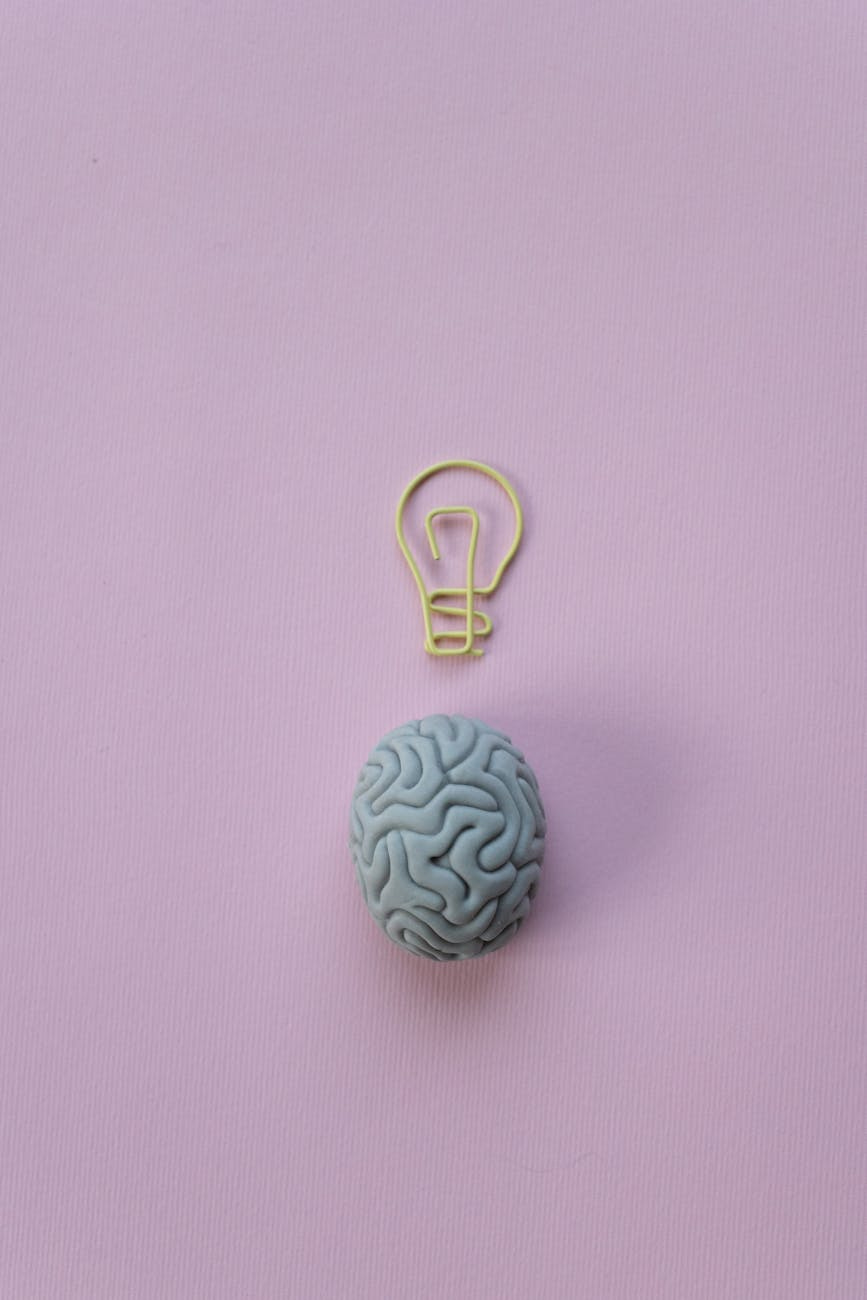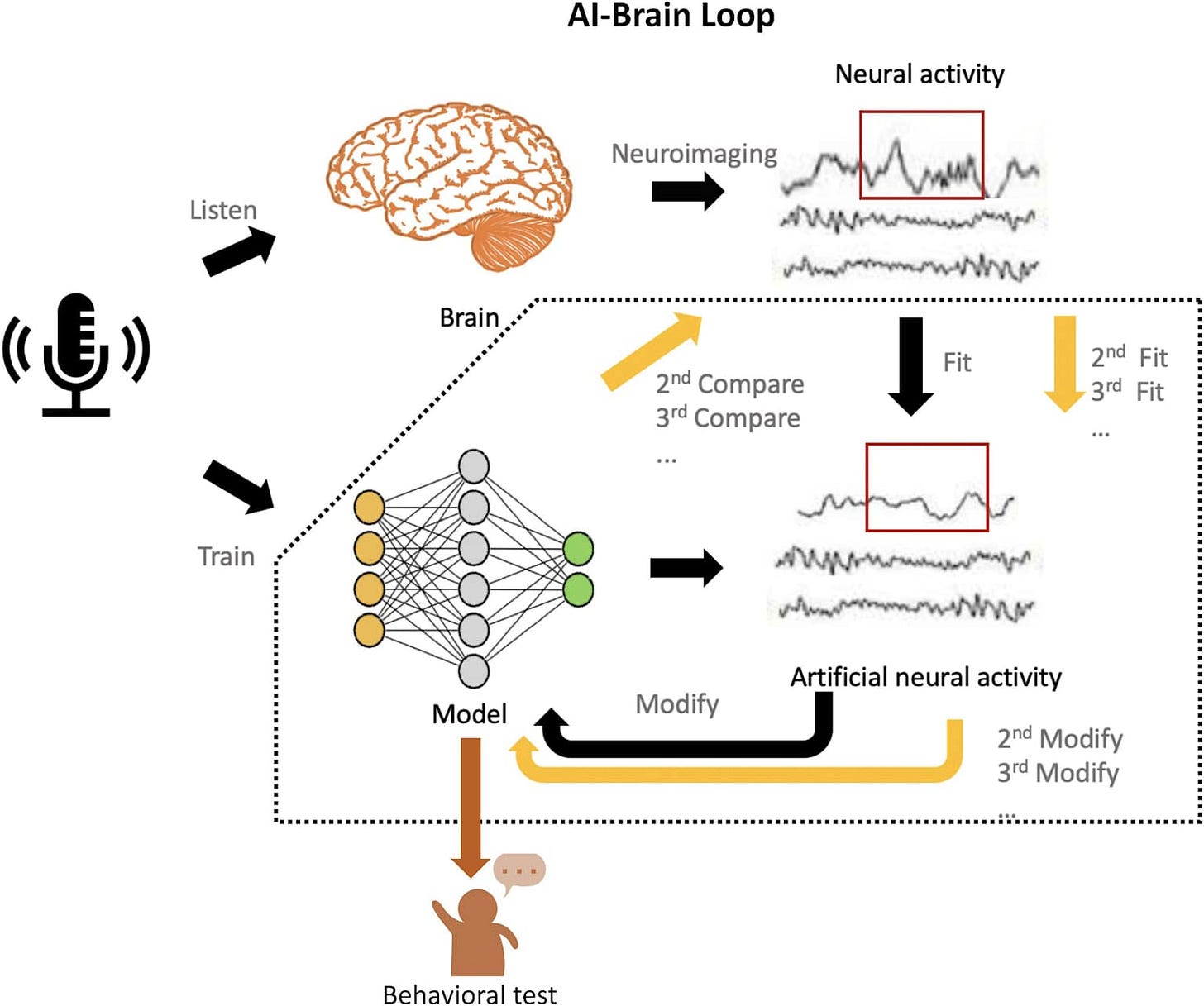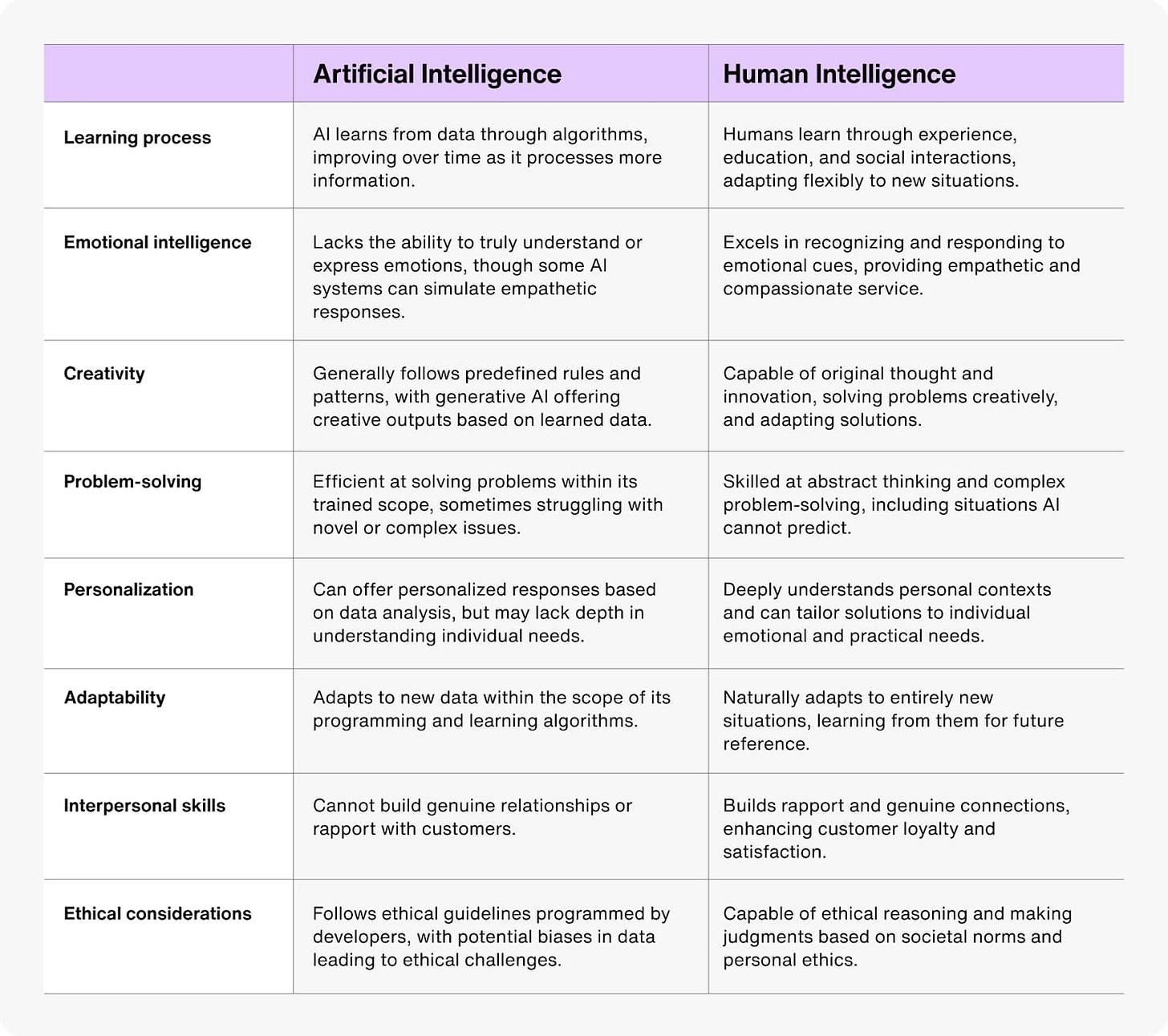The Cognitive Cost of AI: MIT Study Reveals How ChatGPT Affects Our Brains
Why Convenience Today Could Mean Cognitive Decline Tomorrow
Are we getting dumber?
In an era where artificial intelligence has become an extension of our daily lives, a groundbreaking study from the Massachusetts Institute of Technology (MIT) Media Lab has unveiled concerning findings about the impact of ChatGPT on human cognition. Led by Dr. Nataliya Kosmyna, a team of researchers has discovered that our increasing reliance on large language models (LLMs) may be quietly eroding our capacity for critical thinking and deep learning.
Table of Contents
🕖 TL;DR
🧠 Introduction: The Cognitive Cost of AI
🔬 The MIT Media Lab Study: Methodology and Design
🧪 Key Findings: The Neural Impact of AI Use
✍️ Beyond Neural Activity: The Quality and Ownership of Work
💳 The Concept of Cognitive Debt
🧑🏫 Workplace Productivity vs. Educational Concerns
⚖️ Balancing AI Assistance with Cognitive Development
👥 Implications for Different Stakeholders
🏁 Final Thoughts
TL;DR
A recent MIT study examined the cognitive effects of using AI writing assistants.
Frequent reliance on these tools was found to reduce cognitive engagement.
Brain activity weakened in areas related to memory, creativity, and critical thinking.
Participants who used AI showed lower neural connectivity and a diminished sense of ownership over their work.
The study introduces the concept of cognitive debt, the long-term cost of outsourcing intellectual effort to automation.
While AI tools can improve productivity in certain settings, but uncritical use, particularly in education, may impair the development of core thinking skills.
The researchers advocate for a balanced, thoughtful integration of AI to preserve and enhance human cognition.
Introduction
As AI tools become increasingly embedded in educational and professional environments, understanding their effects on our thinking processes becomes not just an academic curiosity but a pressing societal concern. The MIT study introduces the concept of "cognitive debt" - a metaphor for the long-term costs we may incur when trading cognitive effort for AI-assisted convenience. This research has profound implications for how we might integrate these powerful tools more thoughtfully into our educational systems and workplace environments.
The study's findings challenge us to reconsider our rapidly growing dependence on AI assistance, particularly for tasks that have traditionally been central to cognitive development. While ChatGPT offers undeniable benefits in terms of efficiency and accessibility, the MIT researchers warn that these short-term gains might come at the expense of our long-term cognitive capabilities.
The MIT Media Lab Study: Methodology and Design
The MIT Media Lab study, titled "Your Brain on ChatGPT: Accumulation of Cognitive Debt when Using an AI Assistant for Essay Writing Task," employed a rigorous scientific approach to understand how different writing aids affect cognitive engagement. The research team recruited 54 participants from five Boston-area universities, primarily college students aged 18 to 39, and divided them into three distinct groups:
LLM (ChatGPT) Group: Participants who wrote essays using OpenAI's GPT-4o as their primary tool
Search Engine Group: Participants who used traditional search engines but no AI-generated content
Brain-only Group: Participants who wrote essays without any technological assistance
Each participant completed three writing sessions over four months, tackling SAT-style essay prompts on topics ranging from loyalty and philanthropy to vulnerability and perfection. Each session was timed at exactly 20 minutes, creating a controlled environment to measure cognitive performance.
What sets this study apart from previous research on AI use is its neuroscientific approach . Researchers utilized electroencephalogram (EEG) technology to monitor participants' brain activity across 32 regions during the writing process. This provided direct, real-time insight into neural responses and connectivity patterns that simply couldn't be captured through self-reporting or behavioral observation alone.
In a particularly revealing fourth session, a subset of 18 participants switched conditions: those who had previously used ChatGPT now wrote without assistance (LLM-to-Brain), while those who had written independently tried ChatGPT for the first time (Brain-to-LLM). This crossover design allowed researchers to observe how previous AI reliance affected subsequent cognitive performance and neural activity.
Key Findings: The Neural Impact of ChatGPT Use
The EEG data revealed striking differences in brain activity and neural connectivity between the three groups. Participants who relied solely on their own cognitive resources (the Brain-only group) exhibited the strongest and most distributed neural networks, particularly in the alpha, theta, and delta bands associated with creativity, memory integration, and semantic processing.
In contrast, ChatGPT users displayed significantly weaker overall brain connectivity, especially in frontal theta networks linked to working memory and executive function. As Dr. Kosmyna described it, "When you use AI to write, your brain essentially goes into power-saving mode". This cognitive disengagement means that neural pathways responsible for idea generation, critical analysis, and creative synthesis remain underutilized.
The Search Engine group occupied a middle ground, showing moderate neural engagement - stronger than ChatGPT users but not as robust as the Brain-only group. This suggests that not all technological tools impact cognition equally; the key differentiator appears to be how much mental effort is required. Search engines present options that users must evaluate and integrate, while LLMs provide ready-made answers that can be accepted with minimal critical assessment.
Perhaps most concerning was the trend observed over time. With each successive essay, ChatGPT users became increasingly disengaged, often resorting to simply copy-pasting AI-generated content by their third essay. As one researcher noted, "It was more like, 'just give me the essay, refine this sentence, edit it, and I'm done'". This pattern suggests that AI dependency may compound over time, creating a downward spiral of cognitive engagement.
Beyond Neural Activity: The Quality and Ownership of Work
The study extended beyond brain scans to examine the qualitative aspects of the essays produced by each group. Two English teachers evaluated the essays, finding that ChatGPT-assisted writing, while technically proficient, often lacked originality and personal voice. Many were described as "soulless" and formulaic, exhibiting similar expressions and ideas across different participants.
The researchers also conducted linguistic analysis, examining the Named Entity Recognition (NERs), n-gram patterns, and topic ontology within each group. They found consistent homogeneity within the LLM group's writing, suggesting that AI assistance tends to normalize expression rather than enhance individual creativity.
Perhaps most telling were the interviews conducted after the writing sessions. When asked about their essays, ChatGPT users struggled to accurately quote or remember what they had written just minutes earlier. They also reported the lowest sense of ownership over their work, while Brain-only participants expressed the highest satisfaction and connection to their essays.
This diminished sense of ownership raises profound questions about the educational value of AI-assisted work. If students don't feel connected to or responsible for their writing, how much are they actually learning from the process? The MIT study suggests that the convenience of ChatGPT may come at the cost of the deep engagement that makes learning meaningful and lasting.
The Concept of Cognitive Debt
One of the most valuable contributions of the MIT research is the introduction of the concept of "cognitive debt" - a compelling metaphor for understanding the long-term implications of AI reliance. Similar to technical debt in software development, cognitive debt represents the accumulation of mental shortcuts that provide immediate benefits but create long-term problems.
When we outsource thinking to AI, we may gain efficiency in the moment, but potentially at the expense of developing and maintaining our own cognitive capabilities. Over time, this debt compounds, potentially leading to:
Reduced critical thinking abilities
Decreased memory formation and retention
Diminished creativity and original thinking
Lower resistance to manipulation and misinformation
Less confidence in one's own intellectual abilities
The fourth session of the study provided particularly compelling evidence for this concept. Participants who switched from LLM to unaided writing (the LLM-to-Brain group) showed weaker neural connectivity and lower engagement of alpha and beta networks than those who had been in the Brain-only group from the beginning. Their previous reliance on AI had left them cognitively unprepared for independent work.
This finding suggests that cognitive debt is not merely theoretical but measurable in terms of neural activity. Like muscles that atrophy from disuse, cognitive capabilities may weaken when consistently outsourced to AI systems.
Workplace Productivity vs. Educational Concerns
It's worth noting that while the MIT study raises significant concerns about AI's impact on learning and cognition, other research has found positive effects of ChatGPT in workplace settings. A different MIT study from 2023 found that using generative AI like ChatGPT increased productivity by approximately 37% for white-collar workers completing various writing and editing tasks.
This apparent contradiction highlights the nuanced nature of AI's impact. In workplace contexts where the goal is efficient production of high-quality outputs, AI assistance can be tremendously valuable. But in educational settings where the development of cognitive skills is the primary objective, the same technology might undermine the very learning it's meant to support.
Dr. Kosmyna emphasized this distinction when explaining why she published her findings ahead of full peer review: "What really motivated me to put it out now before waiting for a full peer review is that I am afraid in 6-8 months, there will be some policymaker who decides, 'let's do GPT kindergarten.' I think that would be absolutely bad and detrimental. Developing brains are at the highest risk".
While adults with fully developed cognitive abilities might benefit from judicious AI assistance, children and young adults still forming core thinking skills may be more vulnerable to its potentially detrimental effects.
This suggests that age and developmental stage may be critical factors in determining appropriate AI use. While adults with fully developed cognitive abilities might benefit from judicious AI assistance, children and young adults still forming core thinking skills may be more vulnerable to its potentially detrimental effects.
Balancing AI Assistance with Cognitive Development
The MIT study doesn't suggest abandoning AI tools altogether. Rather, it points to the need for more thoughtful integration that balances technological assistance with cognitive development. Several approaches might help strike this balance:
Strategic AI Use: Reserving AI assistance for specific aspects of tasks while maintaining human engagement in others. For example, using ChatGPT for brainstorming or editing, but not for the entire writing process.
Cognitive Scaffolding: Gradually reducing AI assistance as skills develop, similar to how training wheels are eventually removed from a bicycle.
Metacognitive Awareness: Teaching users to be conscious of when and why they're using AI, and encouraging reflection on the cognitive processes being outsourced.
New Assessment Methods: Developing evaluation approaches that value the quality of thinking rather than just the quality of output.
Digital Literacy Education: Helping users understand the limitations and biases of AI systems so they can engage with them more critically.
The search engine group's moderate performance in the MIT study suggests that not all technological assistance is equally problematic. Tools that require users to evaluate, select, and integrate information may help develop rather than replace critical thinking skills.
Implications for Different Stakeholders
The findings from the MIT study have important implications for various stakeholders:
For Educators: The research suggests caution in implementing AI tools in educational settings, especially with younger students. Rather than embracing or rejecting ChatGPT wholesale, educators might consider how to use it selectively to enhance rather than replace student thinking.
For Students: Understanding the potential cognitive costs of AI overreliance might help students make more informed choices about when to use these tools. The research suggests that writing independently, even if more challenging, may better develop the neural connections that support learning.
For Parents: Awareness of how AI tools might impact developing brains could inform decisions about technology use at home and advocacy regarding school policies.
For Policymakers: The study highlights the need for evidence-based approaches to AI integration in education, potentially including age-appropriate guidelines and safeguards.
For Technology Developers: Understanding the cognitive impacts of current AI designs could inform the development of future tools that better support rather than supplant human thinking.
Final Thoughts
The MIT Media Lab study offers an early yet important look at how AI tools may impact human cognition, emphasizing the need for careful integration rather than outright adoption or rejection. The concept of cognitive debt reminds us that while AI can offer convenience and efficiency, it may also compromise our ability to think deeply and independently if overused. As technology becomes more embedded in daily life, we must prioritize human development, recognizing that unlike machines, the brain requires active, sustained engagement to grow and thrive.
Sources
MIT Media Lab. "Your Brain on ChatGPT: Accumulation of Cognitive Debt when Using an AI Assistant for Essay Writing Task."
Kosmyna, N., et al. "The Cognitive Cost of Using LLMs." MIT Media Lab.
Time Magazine. "ChatGPT's Impact On Our Brains According to an MIT Study."
MIT News. "Study finds ChatGPT boosts worker productivity for some writing tasks."
Noy, S. & Zhang, W. "Experimental Evidence on the Productivity Effects of Generative Artificial Intelligence."
Content was researched with assistance from advanced AI tools for data analysis and insight gathering. 


